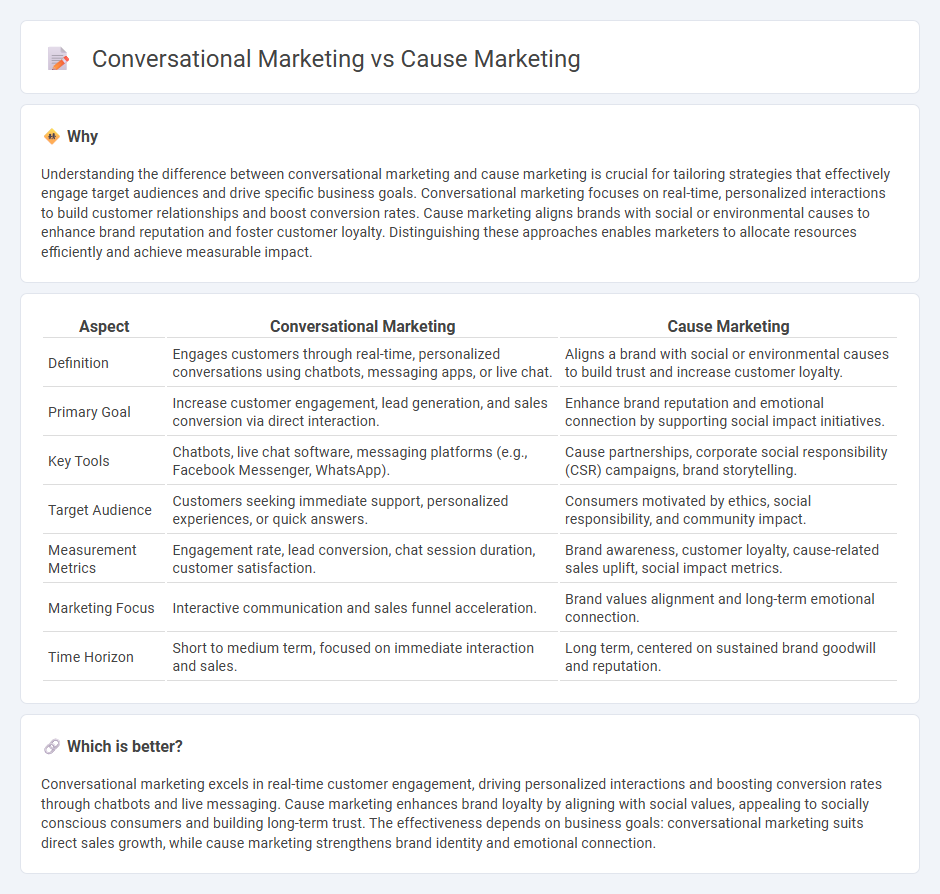
Conversational marketing leverages real-time, personalized interactions through chatbots and messaging apps to enhance customer engagement and drive conversions. Cause marketing aligns a brand with social or environmental causes to build emotional connections and boost brand loyalty among socially-conscious consumers. Explore how integrating these strategies can elevate your marketing impact and foster stronger customer relationships.
Why it is important
Understanding the difference between conversational marketing and cause marketing is crucial for tailoring strategies that effectively engage target audiences and drive specific business goals. Conversational marketing focuses on real-time, personalized interactions to build customer relationships and boost conversion rates. Cause marketing aligns brands with social or environmental causes to enhance brand reputation and foster customer loyalty. Distinguishing these approaches enables marketers to allocate resources efficiently and achieve measurable impact.
Comparison Table
| Aspect | Conversational Marketing | Cause Marketing |
|---|---|---|
| Definition | Engages customers through real-time, personalized conversations using chatbots, messaging apps, or live chat. | Aligns a brand with social or environmental causes to build trust and increase customer loyalty. |
| Primary Goal | Increase customer engagement, lead generation, and sales conversion via direct interaction. | Enhance brand reputation and emotional connection by supporting social impact initiatives. |
| Key Tools | Chatbots, live chat software, messaging platforms (e.g., Facebook Messenger, WhatsApp). | Cause partnerships, corporate social responsibility (CSR) campaigns, brand storytelling. |
| Target Audience | Customers seeking immediate support, personalized experiences, or quick answers. | Consumers motivated by ethics, social responsibility, and community impact. |
| Measurement Metrics | Engagement rate, lead conversion, chat session duration, customer satisfaction. | Brand awareness, customer loyalty, cause-related sales uplift, social impact metrics. |
| Marketing Focus | Interactive communication and sales funnel acceleration. | Brand values alignment and long-term emotional connection. |
| Time Horizon | Short to medium term, focused on immediate interaction and sales. | Long term, centered on sustained brand goodwill and reputation. |
Which is better?
Conversational marketing excels in real-time customer engagement, driving personalized interactions and boosting conversion rates through chatbots and live messaging. Cause marketing enhances brand loyalty by aligning with social values, appealing to socially conscious consumers and building long-term trust. The effectiveness depends on business goals: conversational marketing suits direct sales growth, while cause marketing strengthens brand identity and emotional connection.
Connection
Conversational marketing enhances cause marketing by enabling real-time, personalized interactions that deepen customer engagement with social causes. By leveraging chatbots and messaging apps, brands can effectively communicate their mission-driven initiatives, fostering trust and emotional connections. This synergy drives higher conversion rates and encourages consumer participation in social impact programs.
Key Terms
Cause Marketing:
Cause marketing integrates brand promotion with social or environmental initiatives, aligning a company's values with meaningful causes to boost customer loyalty and brand reputation. This strategy leverages partnerships with nonprofits and community organizations to drive social impact while enhancing consumer engagement and trust. Explore how cause marketing can transform your brand's connection with socially-conscious audiences.
Social Responsibility
Cause marketing leverages brand initiatives that align with social responsibility to foster consumer loyalty and positive public perception. Conversational marketing emphasizes personalized interactions through real-time dialogue, enhancing customer engagement and trust in ethically-driven brand missions. Explore how these strategies integrate to boost both social impact and business growth.
Brand Alignment
Cause marketing emphasizes aligning a brand with social or environmental initiatives to enhance corporate responsibility and build emotional connections with consumers. Conversational marketing leverages real-time, personalized dialogue through chatbots or live chat to deepen customer engagement and drive sales conversion. Explore how integrating brand alignment into these strategies can maximize impact and foster loyalty.
Source and External Links
What is Cause Marketing? - Cause marketing is a strategic partnership between businesses and nonprofit organizations designed to mutually benefit both while increasing brand awareness and engaging customers through social responsibility initiatives.
How Brands Are Driving $2B+ in Social Impact (2025) - Cause marketing involves promotional campaigns between for-profit and nonprofit groups that create social impact, build consumer trust, and can significantly improve customer retention and brand loyalty.
What is Cause Marketing? - Cause marketing is collaboration between a business and a nonprofit to promote social good, enhancing the company's corporate social responsibility and boosting the nonprofit's visibility while meeting growing consumer expectations for ethical practices.
 dowidth.com
dowidth.com